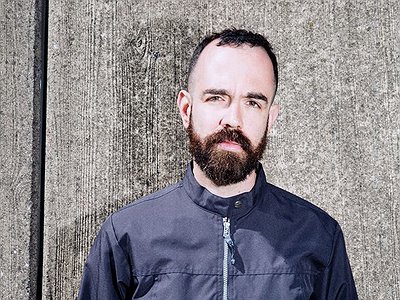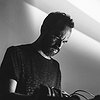Could you take us through a day in your life, from a possible morning routine through to your work? Do you have a fixed schedule? How do music and other aspects of your life feed back into each other - do you separate them or instead try to make them blend seamlessly?
I wish I had a better routine here; I might get aspirational rather than realistic. I’m on a fairly constant tilt of writing and producing and organizing, for myself and others. And I have a pretty nonstop diet of ideas and new technologies, because I’m churning through these in order to write about them.
Everything all the time, nonstop?
Could you describe your creative process on the basis of a piece or album that's particularly dear to you, please? Where did the ideas come from, how were they transformed in your mind, what did you start with and how do you refine these beginnings into the finished work of art?
Bellona all pretty much started as a Reaktor ensemble. It came out of some particular constructions of sound and sequence, and then grew. And the process was then iterative. I tend to work in parallel in real-time and non-realtime. So some of this is about live processes – running through, turning knobs, really playing something live in one take and recording that, as if you’re still working to take. Then some of it is adjusting song structure, shaping things in time.
I’m indebted here to two external sources, too. I found Samuel R. Delany’s book Dhalgren to be a way of understanding the imagery I was creating and giving the whole album a narrative structure, even if just an internal/emotional one. And I got to work with Lars Hemmerling on the mixes; he took a really active role in placing the sounds, adding some additional layering together with a Space Echo, and for me really helping me understand my own ideas more clearly.
It’s the first time this has been a part of my process; it’s really changed how I think, in terms of better appreciating the need for self-examination and transformation as you develop an idea. Mixing is almost like therapy or meditation.
There are many descriptions of the ideal state of mind for being creative. What is it like for you? What supports this ideal state of mind and what are distractions? Are there strategies to enter into this state more easily?
I think I have more trouble getting out of the creative mindset than in it. Ask my tax accountant for confirmation of that. So sometimes it’s absolutely about making the trip to the studio, clearing my mind, and shutting out the outside world. Sometimes it’s about being distracted from something else.
I even kind of like that feeling of fighting with an idea a bit. Battering things into shape, when you’re in total misery, when you’re frustrated with the output … at some point, you figure out that this is part of the fun.
How is playing live and writing music in the studio connected? What do you achieve and draw from each experience personally? How do you see the relationship between improvisation and composition in this regard?
Oh, I find about half of my finished tracks originally started life onstage. Because I tend to improvise when I play, and because you never have as much energy as you do in front of an audience, those materials are priceless. The end result may be indistinguishable from that, but I know that’s where some of the ideas were born.
I also find it’s important to add some live elements, because then you connect to physical gestures and intuition, so those are constantly part of the materials for the track. Of course, then there is something different that can come out of obsessing over shaping those details.
How do you see the relationship between the 'sound' aspects of music and the 'composition' aspects? How do you work with sound and timbre to meet certain production ideas and in which way can certain sounds already take on compositional qualities?
We’re at a bit of a disadvantage in that composition and theory had for centuries neglected really talking about timbre. But I’m not sure there’s any separation between timbre or sound design and composition, any more than rhythm or melody or harmony can be viewed separately. I think the big challenge now is to find greater discipline in actively producing sounds through listening, and finding a way to be articulate about that process. I was lucky to moderate a talk with sound designer Francis Preve at Ableton’s Loop event where he spoke eloquently about that.
Our sense of hearing shares intriguing connections to other senses. From your experience, what are some of the most inspiring overlaps between different senses - and what do they tell us about the way our senses work? What happens to sound at its outermost borders?
I’m personally interested in the synaesthesia between visuals and music; that’s led to returning to Scriabin and his work in that field, as well as a personal interest in Soviet-era audiovisual creations and light art. I have spent some time in collaboration with curator Natalia Fuchs and artist Dmitry Morozov (vtol) in that, including working with the Prometheus Institute in Kazan, Russia. There’s a whole Russian legacy of trying to produce immersive audiovisual performance, and it’s tremendously evocative. I think just as organizing sound and image on their own can help other people tap into emotions and trance states, of course organizing the two at once can go even further.
Art can be a purpose in its own right, but it can also directly feed back into everyday life, take on a social and political role and lead to more engagement. Can you describe your approach to art and being an artist?
I’m not sure of the social relevance of my own art, individually; that’s something a bit too personal to give that kind of significance. But I think that’s why we share platforms with other people. I spent a lot of time in social organizing in the environmental movement, so now I tend to look at music knowledge as being something that can have this grassroots power. We live in a world that’s inundated with data; music technology is a way to help build the kind of literacy that can help us thrive in that environment. It really excites me that the dozens of people who have participated in doing these hacklabs have gone on to build new collaborations in expanding technological experimentation. I hope I get to challenge myself more to work with others to make ideas spread. There’s certainly enough ignorance and exclusion spreading; we better find a way to focus on being an alternative to that energy.
It is remarkable, in a way, that we have arrived in the 21st century with the basic concept of music still intact. Do you have a vision of music, an idea of what music could be beyond its current form?
On one hand, I think we’ve come full circle. People are beginning to realize that the narrow culture of broadcast music and records pales in comparison to music that everyone makes. So the idea of jamming, of live performance, of folk music – all of these things are coming to electronic music. Don’t get me wrong: I think fixing musical ideas in an album is a wonderful way to make an artistic statement. I just think we can simultaneously get back to the notion of musical activity being someone that engages everyone. We had that since the dawn of civilization, and it still coexisted with some people being full-time musicians, some people being more virtuosic or more innovative than others. Those things happened, and still your family or friends would get together and have singalongs.
On the other hand, I think by engaging technology anew, music is finding relevance to fields like science and the exploration of space. We’re already seeing musical output that takes the form of software, too. And we’re seeing new possibilities in spatialized sound in venues – like a real-world immersive alternative to virtual reality, one you can experience in a night out instead of strapped into goggles.
I think the common thread in all this is, there’s no reason to be limited to paradigms like a studio or a multi-track recording. Music is something you feel everywhere; so why not have it also be everywhere?



